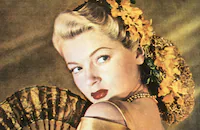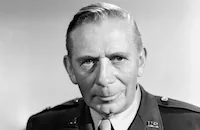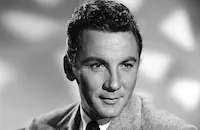Homecoming

Brief Synopsis
Cast & Crew
Mervyn Leroy
Clark Gable
Lana Turner
Anne Baxter
John Hodiak
Ray Collins
Film Details
Technical Specs

Synopsis
On a transport ship carrying 200,000 American soldiers who are returning home from their tour of duty in Europe after World War II, Mr. Williams, a journalist, asks Colonel Ulysses Delby Johnson of the 299th medical outfit about his personal experiences during the war. Ulysses then tells a story that begins in 1941, when he was Chief Surgeon at an American hospital: Although few dispute his skills as a medical practitioner, Ulysses' ethics are called into question one day by a colleague and friend of his, Dr. Robert Sunday. Sunday calls Ulysses a hypocrite for lamenting the London Blitz, when in America, in nearby Chester Village, poverty-stricken men, women and children have been under attack for years by the ravages of malaria, malnutrition, hookworms and the like. Sunday also accuses Ulysses of running off to join the army simply because it is in fashion. After parting with his wife Penny and completing basic training, Ulysses sails to Europe and meets the nurse assigned to him, the hard-boiled Lieutenant Jane "Snapshot" McCall. Ulysses' strictness and Jane's flippancy soon put the two at odds, but they eventually overcome their differences and become friends. Their friendship blossoms over time, and following an aerial attack on their medical camp, Jane and Ulysses, whom she playfully calls "useless," take a trip together. Their high spirits are soon dampened, however, when, after returning to camp, Ulysses watches his friend, Sergeant Monkevickz, die of a ruptured malaria-infected spleen. His friend's death is made even more painful by the knowledge that it was caused by a disease that he contracted in Chester Village, a disease that Sunday mentioned as having been utterly neglected by local physicians. The next morning, as Ulysses and Jane take cover from another aerial attack, Ulysses confesses that he treated Monkevickz as "just another case" and never cared enough about him as a human being to do any good for him. In an attempt to expiate his guilt, Ulysses writes to Penny and asks her to visit Monkevickz's father in Chester Village. While carrying out her husband's request, Penny runs into Sunday, and confides in him that she suspects Ulysses is having an affair with Jane, the woman about whom he often writes. Following the D-Day invasion of Europe, Jane is reassigned and kisses Ulysses goodbye. The two are soon reunited, however, during a chance meeting in Paris, and together they set out to rescue the 299th division, which is trapped in enemy fire in the Battle of Anzio. Some time later, Ulysses returns home depressed. He apologizes to Sunday for not paying heed to his criticisms, and then tells Penny that he has lost his self-assurance after watching Jane die of a gunshot wound in a hospital. Ulysses asks Penny to be patient with him until his emotional wounds have healed, and she gladly accepts the responsibility, sealing her love for her husband with a hug.

Director

Mervyn Leroy
Cast

Clark Gable

Lana Turner

Anne Baxter

John Hodiak

Ray Collins

Gladys Cooper

Cameron Mitchell

Marshall Thompson
Lurene Tuttle
Jessie Grayson
J. Louis Johnson
Eloise Hardt
Bill Self

Jeff Corey

Thomas E. Breen
Wheaton Chambers
Frank Mayo

Roger Moore
Dan Quigg
Broderick O'farrell
George Sherwood
Charles Miller
Nolan Leary
Phil Dunham
Bert Moorehouse
David Newell
Kay Mansfield
Peggy Badey
William Forrest
Dorothy Christy

Anne Nagel
James Bush
David Clarke

Joseph Crehan
Johnny James
James Taggart
Jerry Jerome
John Albright

Michael Kirby
Lew Smith
Arthur Space

Wally Cassell
Frances Pyle
Vernon Downing
Danielle Day
George Offerman Jr.
Alphonse Martel
Gaylord Pendleton
Robert Manning
Jay Norris
Lisa Golm

Geraldine Wall
Frank Arnold
Leslie Dennison
Olga Borget
Mimi Doyle

Queenie Leonard
Virginia Keiley
Fern Eggen
Mary Jo Ellis
Francine Bordeaux
Leo Vandervelde
Jeanne Lafayette
Albert Pollet

Alan Hale Jr.

Arthur O'connell
Charles Meredith
William Tannen
Edwin Cooper

Gregg Barton
Ralph Montgomery
Robert Skelton
Louise Truax
Louise Colombet
Charles Prescott
Art Baker
Crew
Jack Dawn
Randall Duell
John Dunning
Norman Elzer
Sidney Franklin
Cedric Gibbons
A. Arnold Gillespie
Henry W. Grace
Sydney Guilaroff
Bronislau Kaper
Sidney Kingsley
Captain Margary Kowaleski
Mervyn Leroy
Paul Lund
Jan Lustig
Warren Newcombe
Paul Osborn
Charles Previn
Gottfried Reinhardt
Helen Rose
Harold Rosson
Douglas Shearer
Colonel James L. Snyder
Edwin B. Willis

Film Details
Technical Specs

Articles
Homecoming
Playwright Sidney Kingsley dubbed his original 1944 story treatment The Homecoming of Ulysses, and the narrative wasn't particularly subtle in its invocation of Homer's epics. At the close of the 1930s, the gifted surgeon Ulysses "Lee" Johnson (Gable) has his priorities in order regarding his own success and pleasure. After-hours are spent in indulgence for himself and his beautiful young wife Penny (Anne Baxter); he diffidently ignores the entreaties of idealistic med-school colleague Bob Sunday (John Hodiak), who'd like his consultation regarding the spread of malaria amongst the local poor.
Johnson signs up for officers' training after Pearl Harbor's attack, less out of any genuine convictions than wanting to put up the proper appearance. On the transport ship to Africa, his self-absorbed musings raise the gall of Lt. Jane "Snapshot" McCall (Turner), a plain-speaking nurse who'd lost her pilot husband in the China skies and with little patience for those who regarded the conflict as an idle diversion.
From this auspicious beginning, their relationship initially remains chilly, as she takes to referring to him as "Useless" behind his back. The trials of war cause them to soften their stances, as he comes to respect her dedication, and she, his willingness to spend endless shifts in surgery and to apologize for his bullheadedness. Neither wants to admit where this growing bond is heading. It takes a stranding at a Parisian farmhouse during the Battle of the Bulge for them to profess their feelings, and face the consequences.
Homecoming was Gable's third project for MGM after he was mustered out of the Air Force. The actor turned to the service in 1942 after the untimely death of beloved wife Carole Lombard, who perished in a plane crash during her return from a war bond drive. Gable patently had to have tapped into these sorrows for his performance here, as the world-weariness and sense of loss that he projects as the homebound Ulysses are palpable. Baxter, on loan for Fox, delivered effective work as the pampered spouse struggling with her private dread; ironically, then-husband Hodiak was cast as the other man providing a shoulder to lean on.
The direction of Homecoming was handled by Mervyn LeRoy, who gave Turner her memorable debut role in They Won't Forget (1937), and who'd also encouraged Gable earlier in his career, wrangling him a screen test for Warners in 1930. The role of Snapshot was an uncharacteristically unglamorous assignment for Turner, and she acquitted herself strikingly well, coming across as earthy, accessible, and undeniably appealing, never more so than in the engaging sequence where she confidently coaxes the comparatively sheepish Gable to an ancient Roman spring for a long-needed bath. "I think Homecoming showed Lana at her sexiest," LeRoy recalled in his autobiography Take One. "There was one scene where she came out of a swimming pool, water dripping from her hair. It was accidental at first--the same as her sweaters were accidental at first--but it was a happy accident."
Homecoming represented the third of four times that Gable and Turner would pair up onscreen, the other films being Honky Tonk (1941), Somewhere I'll Find You (1942) and Betrayed (1954). Despite a 19-year age difference, their chemistry was undeniable, with MGM's press ballyhoo for Homecoming deeming them "the team that generates steam." In her autobiography Lana: The Lady, the Legend, the Truth, Turner shared an anecdote from the set regarding the consequences of her on-camera ardor with Gable. "To keep my mouth fresh for those clinches I chewed gum, and during takes I would poke the wad up next to my teeth," the actress recalled. "But once Clark kissed me too forcefully. When he drew back we were attached by a ribbon of sticky gum! I shrieked with laughter as Clark glumly picked the gum from his teeth. From then on I gargled instead."
Producer: Sidney Franklin, Gottfried Reinhardt
Director: Mervyn LeRoy
Screenplay: Sidney Kingsley (story), Jan Lustig, Paul Osborn
Cinematography: Harold Rosson
Film Editing: John Dunning
Art Direction: Randall Duell, Cedric Gibbons
Music: Bronislau Kaper
Cast: Clark Gable (Col. Ulysses Delby Johnson), Lana Turner (Lt. Jane McCall), Anne Baxter (Mrs. Penny Johnson), John Hodiak (Dr. Robert Sunday), Ray Collins (Lt. Col. Avery Silver), Gladys Cooper (Mrs. Kirby).
BW-113m.
by Jay S. Steinberg

Homecoming
Quotes
Trivia
Notes
The working title for this film was The Homecoming of Ulysses. According to a September 1947 article in New York Times and an M-G-M News news item, an elaborate set that included five thirty-five foot towers, an evacuation hospital and more than one hundred army field tents was constructed at the Lasky-Mesa ranch, thirty miles from Hollywood, for the filming of the Anzio battle scene. The battle scene, which took three weeks to prepare and used hundreds of extras, five cameramen and six assistant directors, was a recreation of the historic capture of the Anzio beachhead in Italy by U.S. and British forces on January 22, 1944. Soon after its release, Homecoming was selected by New York film critics as one of the ten worst pictures of 1948. In 1951, according to New York Times, the film appeared, along with two other films, on the first airing of an experimental television broadcasting service called "Phonevision." The Phonevision service, an early predecessor to "pay-per-view" television, was developed by the Zenith Radio Corporation and was designed to bring feature-length pictures to television viewers, who paid one dollar for each film they selected. This was the third of four films in which Clark Gable and Lana Turner co-starred.















